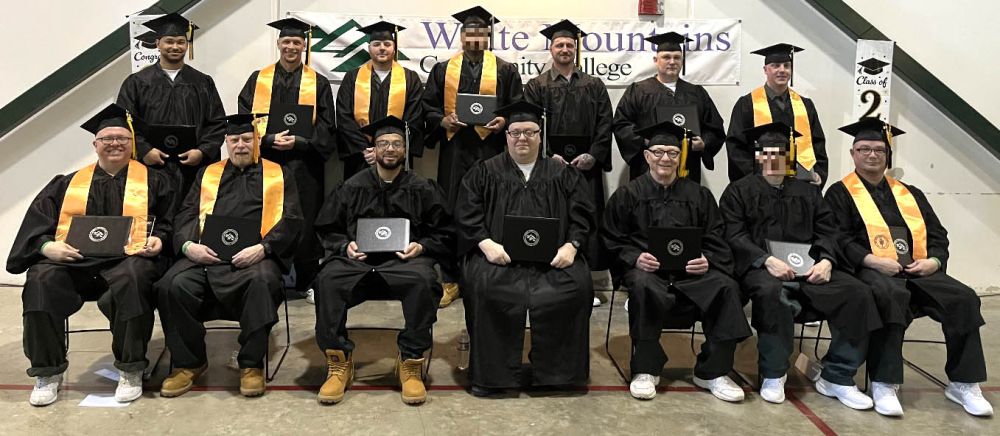
The first graduation class of the program (Two faces have been blurred per the graduates’ request) (Photo Courtesy of New Hampshire DOC)
When 14 incarcerated students graduated from White Mountains Community College’s prison education program in Berlin this past May, they marked the first cohort in NH to earn associate degrees behind bars in decades. Now, with new grant funding, the program is preparing to expand across the state.
White Mountains Community College (WMCC) is one of five New England institutions awarded a $100,000 Accelerator Grant from the New England Prison Education Collaborative, a regional initiative under the New England Board of Higher Education. Funded through a five-year, $6.7 million investment from Ascendium Education Group, the grants are designed to help colleges expand Pell-eligible higher education programs in prisons.
“For nearly 30 years, higher education in prison survived largely on private fundraising and heroic efforts by individuals,” says Sarah Kuczynski, the
collaborative’s director. “The return of Pell eligibility represents a transformative reinvestment of federal dollars, and our goal is to make sure New England institutions can seize this moment in strategic and impactful ways.”
Launched in March 2023, WMCC’s Berlin program offers associate degrees in business administration and liberal arts. With the grant, the college is creating a statewide director position to extend offerings to the men’s and women’s prisons in Concord and to strengthen transfer pathways into bachelor’s degree programs through the University System of NH.
Leah Maciejewski, vice president of academic affairs at WMCC, says expansion is essential to equity. Currently, Berlin is the only site in NH offering Pell-eligible courses, and no programs are available to incarcerated women. “It can’t just be one program in one facility in one part of the state,” she says. “We want to open up doors to expand our reach.”
“I would love to see a community college program in all state prisons, and even the federal prison in Berlin,” Maciejewski says. “Most people in prison are eventually released, and we want them to have something to look forward to. This is about preparing people for what comes next.”
For more information about White Mountains Community College, visit wmcc.edu.
